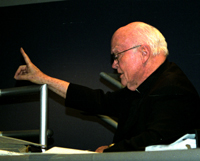Exercising his presidential fiscal control over athletics, Interim University President the Rev. William Byron, S.J., has allocated six athletic scholarships to the basketball program for the 2004 -05 academic year.
The six scholarships, which will pay for the athletes’ full tuition, are divided equally between the women and men’s teams.
“We thought it was needed,” Byron said. “They will improve the quality of basketball, and it’s something the students wanted. Every team we play gives scholarships. We ought to do what we can to stay competitive.”
A presidential ad hoc committee has been formed to oversee the implementation of the scholarships and to decide whether to expand the scholarship program in the future. One detail to be worked out by the committee is whether the room and board of the scholarship athletes will be covered by the scholarships.
Deborah Stieffel, Dean of Admissions, said that she will decide when the committee will meet for the first time. Peter Burns, political science assistant professor, will be the chairman.
Byron said that he doesn’t believe that the athletic scholarships will expand beyond this stage.
Women’s basketball coach DoBee Plaisance said that the academic prowess of the university would not decline due to these scholarships.
“Athletes still have to meet Loyola admissions requirements,” Plaisance said. “We will still be getting top students who will also be participating in athletics.”
Byron said that for recruits to receive the athletic scholarships, they must have a 3.0 grade point average in high school and a 24 on the ACT. Byron also said that the scholarships will help to “racially integrate the teams.”
Several members of the faculty expressed their disapproval at the University Senate meeting Jan. 15 that they were not consulted on such a major decision.
“There was no discussion among the faculty,” Earl Richard, religious studies professor said. “I’m flabbergasted. The faculty is against this. We don’t all have to agree but not consulting [the faculty] is strange.”
Part of the senate’s agenda was to appoint a member to the ad hoc committee. Mary Blue, associate professor of communications, said that she was opposed to putting any faculty member on the committee.
“I don’t want scholarships without a discussion,” she said. “The faculty was never polled. I don’t have confidence in an interim president who is changing our whole lives without even consulting us.”
But Student Government Association President Bea Forlano said that since the issues have been discussed so many times in the past, consultation with the faculty was not necessary before this decision.
“It’s good to have a decision one way or the other. Most of the pros and cons have been raised already. It was time to say yes we will (have scholarships) or no we won’t (have scholarships) and make a stand.”
Marcus Smith, associate professor of English, said that the three scholarships per team will “drive away athletes who don’t want to be second class athletes.”
Plaisance said that the scholarships will improve the department by improving the quality of the teams.
“Our teams have done well considering the obstacles,” she said. “The scholarships will enhance what we already have. We will be getting quality student athletes. Our team now just needs some help. We need the depth [the scholarships will bring].”
Forlano is excited about the decision to bring back scholarships to the athletic department. No athlete has been on scholarship since intercollegiate athletics were cancelled following the 1971-72 school year.
“I was ecstatic,” she said. “The students have been pushing for this for a long time. In the long run, this will increase school spirit. Initially, it validates the athletic program and its hard work.”
Forlano said that when the student body was polled two years ago about whether or not to have scholarship athletes, 78 percent responded in favor.
Communications senior Matt Johnson, the public address announcer for Wolfpack home games, said that scholarships for athletes are overdue.
“It’s a shame it took them this long,” Johnson said. “We’ve lost too many great players in the past due to lack of scholarships.”
In 1991, the Board of Trustees voted to have intercollegiate athletics return to campus life, with one of the six main points being not to have scholarships.
Dr. Thomas Smith, associate dean of Arts and Sciences, said he supports athletic scholarships.
“If we’re going to be involved in athletics in a quality manner, they are necessary,” said Smith, who serves as a faculty athletic representative to the National Association of Intercollegiate Athletics. “But I want their final form to emerge from a quality process.”







